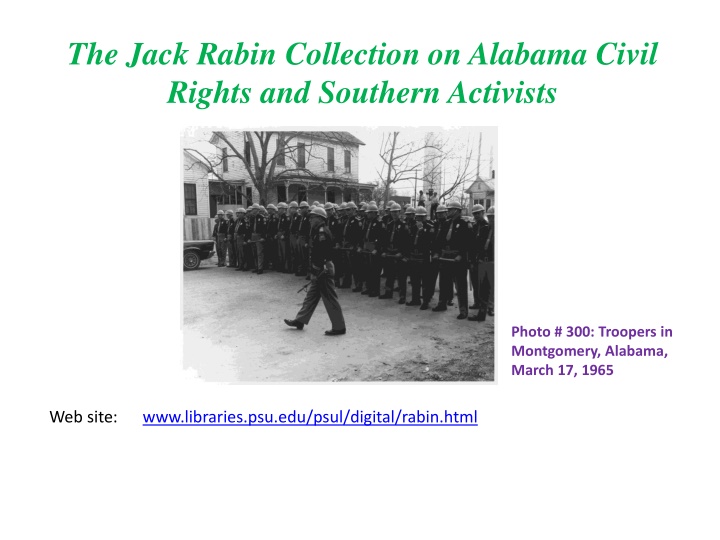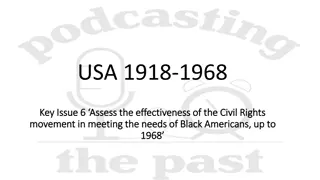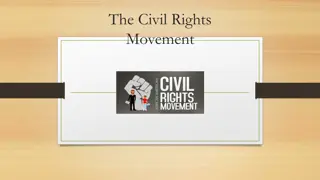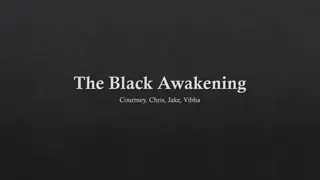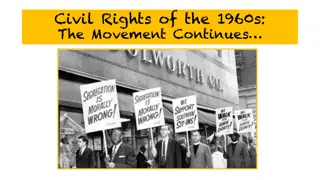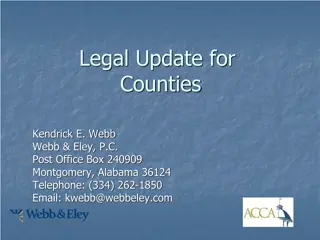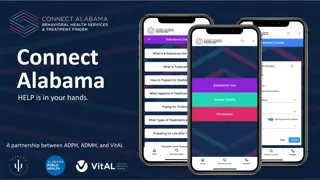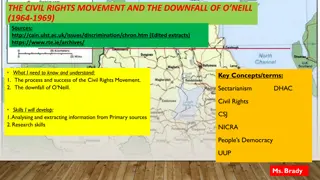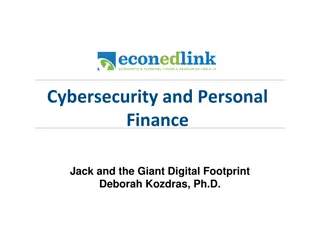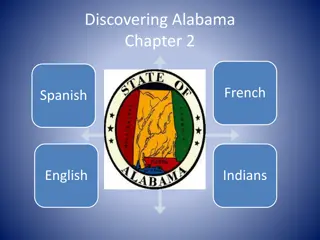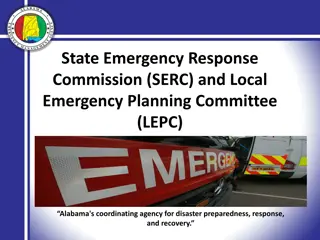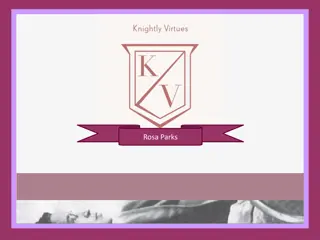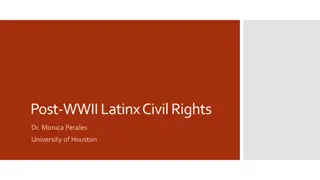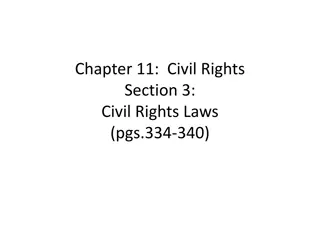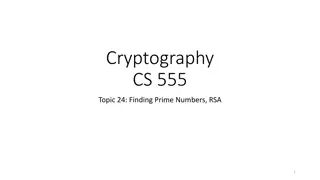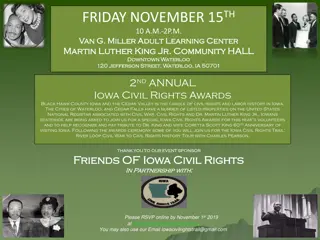The Jack Rabin Collection: Alabama Civil Rights Movement
Explore historical images documenting key moments of the civil rights movement in Alabama, including the Selma-to-Montgomery March and demonstrations in Montgomery. Images feature prominent figures like Martin Luther King Jr. and E.D. Nixon, showcasing the resilience and activism of Southern activists in the 1960s.
Download Presentation

Please find below an Image/Link to download the presentation.
The content on the website is provided AS IS for your information and personal use only. It may not be sold, licensed, or shared on other websites without obtaining consent from the author.If you encounter any issues during the download, it is possible that the publisher has removed the file from their server.
You are allowed to download the files provided on this website for personal or commercial use, subject to the condition that they are used lawfully. All files are the property of their respective owners.
The content on the website is provided AS IS for your information and personal use only. It may not be sold, licensed, or shared on other websites without obtaining consent from the author.
E N D
Presentation Transcript
The Jack Rabin Collection on Alabama Civil Rights and Southern Activists Photo # 300: Troopers in Montgomery, Alabama, March 17, 1965 Web site: www.libraries.psu.edu/psul/digital/rabin.html
Slide #4, sheet 1, folder 1, box 3: Jack Rabin (left) and E. D. Nixon (right) in front of Dexter Avenue Baptist Church, Montgomery, Alabama, April 1974.
Selma-to- Montgomery March photos Photos #5 and #10: Bloody Sunday, as the first attempt at a Selma- to-Montgomery march is halted at the Edmund Pettis Bridge in Selma, March 7, 1965
Photo #209: Marchers with signs, Montgomery, March 10 , 1965
Photo #276 (right): On March 11, 1965, while a Selma-to- Montgomery March is considered in court, demonstrators in Montgomery continue to test the temporary injunction against marching. Photo #277 (left): James Forman of the Student Non-violent Coordinating Committee (SNCC) is among those dragged towards a police van.
Selma-to-Montgomery March, the scroll: a transcription of the final two hours of speeches at the conclusion of the Selma- to-Montgomery March, March 25, 1965, reconstructed from four reel-to-reel tapes recorded by the Subversive Unit of the Investigative and Identification Division of the Alabama Department of Public Safety.
Montgomery, Alabama State of Alabama Office Building Capitol Dexter Avenue Baptist Church State of Alabama Public Safety Building
Audio sample #1: In March 1968, at a mass meeting in Bessemer, Alabama, for the Poor People's Campaign, Martin Luther King describes his arrival via a harrowing air flight. CD09AE, track 1, 01:46-05:04 I m glad to be here for several reasons, particularly [ ? ? ] understand, in order to touch all these places that we had to touch, we often charter a plane. You know, you get a plane, you rent it, and then [ ? ? ]. And they stick with you, to land in places that the big commercial airliners can t land. We have a very comfortable and safe and beautiful plane (Yeah) that we use for this purpose. And we landed, or the plane waited for us, in Marion, Alabama. So they don t have a tower. Now in most airports, the major airlines, they have a tower. The people up in the tower find out which runway you re coming on, the feet, the number of feet, the altitude that you agreed, what [?] you re going to take. They re [?] in the tower. And the lights on the runway go out at a certain time, you know. Not having planes coming in, they turn the lights out at certain times. They were gracious enough to turn the lights back on, so that we could take off.
Then we took off. And we got up about a thousand feet, and the little door on the hub of the plane just popped open. It had all of our bags [ ? ? ] just popped open. So one of the problems is that we had to go back in. And we didn t know what was wrong, except for [ ? ? ] plane [?] equipment. But we didn t know what was wrong. He finally told us what it was. "The door is unhooked. It s got all your baggage." And turned around. And then just as we got ready to land, the lights went out on the runway. So we couldn t land. They couldn t see where to land. Then we got back up, and I said, Well, what about the bags? [ ? ? ]. He said, Well, our only problem is if the bags drop out, they may hit the propeller, and that will break the propeller, and I said, Good God! [Laughter]. But anyway, he says, Our only hope is if we are running in very good weather, and we re going to try to get through to Birmingham. So we made it into Birmingham and got on the ground. And as I so often say, I don t want to give you the impression that I don t have faith in God in the air (All right). It s simply that I have more experience with him on the ground [Laughter].
Audio sample #2:Introduced by King at that same Bessemer meeting, Ralph Abernathy presents his argument for reparations for African-Americans. CD09AE, track 2, 05:24-08:54 We were here before the Puritan fathers landed at Plymouth, I said (Yeah, yeah). We were here before Patrick Henry cried out, There must not be taxation without representation (Yes, all right, yes, yeah). We were here before the first protest movement took place in this country, the Boston Tea Party (Yes, yeah, yeah). We were here before the cry went out, Give me liberty or give me death (Yes). We were here before George Washington led the army against the great British Empire and defeated it in our quest for freedom and equality, and to do away with colonialism and exploitation (Yes, yeah). We were here before the cry went out, Go West, my son, go West. We were here before the skyscrapers lifted themselves in the great city of New York (Yes) and the other countries other cities of this country (Yes, yeah). We have been here a long time (All right, you know), and we have known two-hundred and forty-four years of slavery (Yes, yeah, yes), injustice (Yes), and inequality on the theory of separate but equal (Yes sir)
Then, in seventeen-hundred and seventy-six, this country of ours wrote us a check. Through the Declaration of Independence, they said, We hold these truths to be self-evident, that all men (All) not some men (Man), but all men (All, yes) all men were created equal, and they are endowed by their Creator (Uh-huh) with certain inalienable rights (Yes sir). Among these are life, liberty, and the pursuit of happiness (Yeah). They gave us our check (Yes sir), and as black men, as negro men and women, we sought to cash that check (Yes, uh-huh, yes), and that check bounced (Yeah) [Laughter], marked insufficient funds [Applause; recording interrupted]. [recording resumes in mid-sentence] . . . (All right). I know you won t [?] Dr. King, but that s all right. I have fooled them before [Laughter and applause].
It came back marked insufficient funds ( ? ? ). Then in eighteen-hundred and sixty- three (Uh-huh) we got another check (Yeah). I m talking about black (Yeah) means (Right on, yeah). This time it was signed by Abraham Lincoln (Okay, yeah) and called the Emancipation Proclamation (That s right), with the seal of the government upon it (Yeah, yes). They gave us that, and it said that we were entitled to our rights (Yeah, yes). They promised us not only our rights, but our freedom (Yes). They promised us 40 acres and a mule (Yeah, all right). And then we presented that check to our government, and it came back no mark not only marked insufficient funds, but insufficient means on it (Yes) [Applause; recording interrupted]. Photo #374: Undated Alabama State Patrol arrest photo of Ralph Abernathy (1960s).
